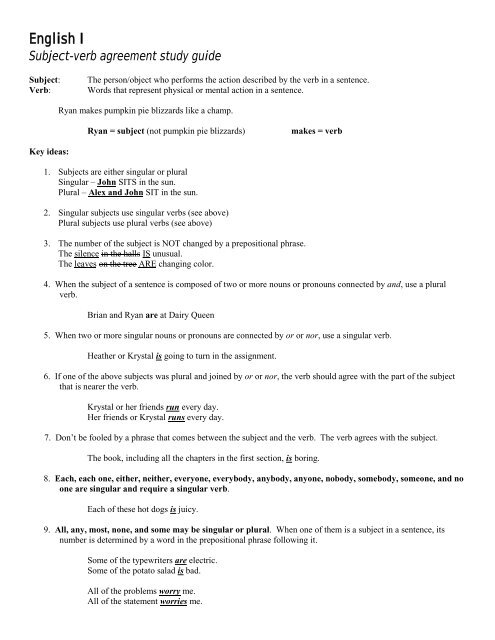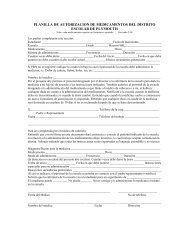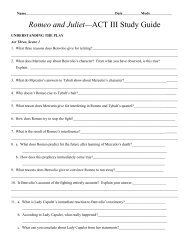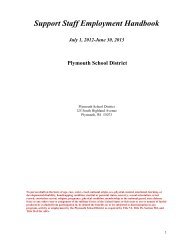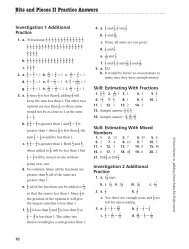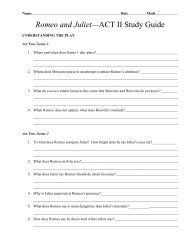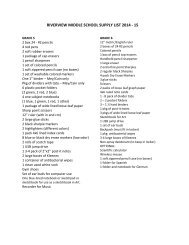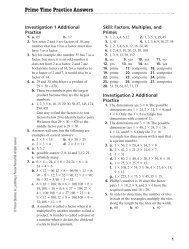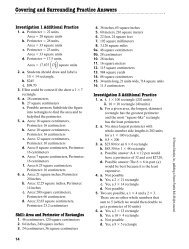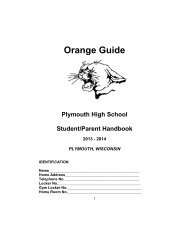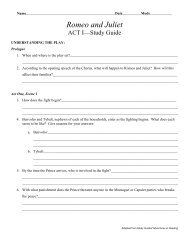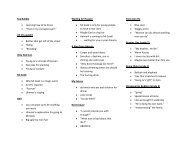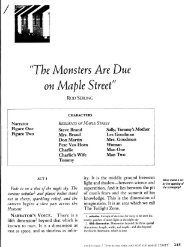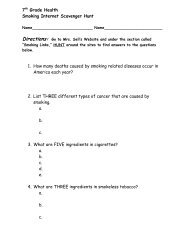AGREEMENT (subject-verb, pronoun-antecedent) study guide
AGREEMENT (subject-verb, pronoun-antecedent) study guide
AGREEMENT (subject-verb, pronoun-antecedent) study guide
You also want an ePaper? Increase the reach of your titles
YUMPU automatically turns print PDFs into web optimized ePapers that Google loves.
English I<br />
Subject-<strong>verb</strong> agreement <strong>study</strong> <strong>guide</strong><br />
Subject:<br />
Verb:<br />
The person/object who performs the action described by the <strong>verb</strong> in a sentence.<br />
Words that represent physical or mental action in a sentence.<br />
Ryan makes pumpkin pie blizzards like a champ.<br />
Ryan = <strong>subject</strong> (not pumpkin pie blizzards)<br />
makes = <strong>verb</strong><br />
Key ideas:<br />
1. Subjects are either singular or plural<br />
Singular – John SITS in the sun.<br />
Plural – Alex and John SIT in the sun.<br />
2. Singular <strong>subject</strong>s use singular <strong>verb</strong>s (see above)<br />
Plural <strong>subject</strong>s use plural <strong>verb</strong>s (see above)<br />
3. The number of the <strong>subject</strong> is NOT changed by a prepositional phrase.<br />
The silence in the halls IS unusual.<br />
The leaves on the tree ARE changing color.<br />
4. When the <strong>subject</strong> of a sentence is composed of two or more nouns or <strong>pronoun</strong>s connected by and, use a plural<br />
<strong>verb</strong>.<br />
Brian and Ryan are at Dairy Queen<br />
5. When two or more singular nouns or <strong>pronoun</strong>s are connected by or or nor, use a singular <strong>verb</strong>.<br />
Heather or Krystal is going to turn in the assignment.<br />
6. If one of the above <strong>subject</strong>s was plural and joined by or or nor, the <strong>verb</strong> should agree with the part of the <strong>subject</strong><br />
that is nearer the <strong>verb</strong>.<br />
Krystal or her friends run every day.<br />
Her friends or Krystal runs every day.<br />
7. Don’t be fooled by a phrase that comes between the <strong>subject</strong> and the <strong>verb</strong>. The <strong>verb</strong> agrees with the <strong>subject</strong>.<br />
The book, including all the chapters in the first section, is boring.<br />
8. Each, each one, either, neither, everyone, everybody, anybody, anyone, nobody, somebody, someone, and no<br />
one are singular and require a singular <strong>verb</strong>.<br />
Each of these hot dogs is juicy.<br />
9. All, any, most, none, and some may be singular or plural. When one of them is a <strong>subject</strong> in a sentence, its<br />
number is determined by a word in the prepositional phrase following it.<br />
Some of the typewriters are electric.<br />
Some of the potato salad is bad.<br />
All of the problems worry me.<br />
All of the statement worries me.
Subject-<strong>verb</strong> agreement with compound <strong>subject</strong>s:<br />
1. Use a plural <strong>verb</strong> when two singular <strong>subject</strong>s are joined by and (remember, plural <strong>verb</strong>s aren’t the ones that<br />
end in “s”).<br />
The playful lobster and the annoying crab are going to be dinner soon.<br />
*If the items in a compound <strong>subject</strong> actually refer to the person/thing, use a singular <strong>verb</strong>.<br />
Chicken and Dumplings is my favorite dish.<br />
2. Use a singular <strong>verb</strong> when two singular <strong>subject</strong>s are joined by or or nor.<br />
A pen or a pencil is needed for this test.<br />
Niether Miami nor Jacksonville is the capital of Wisconsin.<br />
3. Use a plural <strong>verb</strong> when two plural <strong>subject</strong>s are joined by and, or, or nor.<br />
Rabbits or guinea pigs are great pets.<br />
4. When both a singular <strong>subject</strong> and a plural <strong>subject</strong> are joined by or or nor, the <strong>verb</strong> should agree with the<br />
<strong>subject</strong> closest to the <strong>verb</strong>.<br />
Either Dan or his friends are mistaken.<br />
Niether the actors nor the director was on time.
English I<br />
Pronoun-<strong>antecedent</strong> agreement <strong>study</strong> <strong>guide</strong><br />
1. A <strong>pronoun</strong> agrees with in number and gender with its <strong>antecedent</strong> (the word before it to which it refers).<br />
Antecedent Pronoun<br />
Gail lost HER book.<br />
Each of the men puts on HIS hardhat.<br />
Alex or Bill will bring HIS football.<br />
Everyone must bring HER (or HIS – choose one or the other) book to class.<br />
(Here, it’s best to pluralize the <strong>subject</strong>: All students must bring their books to class.)<br />
singular <strong>pronoun</strong>s:<br />
anything anyone anybody<br />
something someone somebody<br />
nothing no one nobody<br />
each one another<br />
either neither much<br />
plural <strong>pronoun</strong>s:<br />
both few many several<br />
either singular or plural (depends on whether the object of the preposition is singular or plural):<br />
all none some any most


